Queen of the Damned tvc-3 Read online
Page 31
COMING TOGETHER
THEY MET AGAIN AT THE EDGE OF THE REDWOOD forest, their clothes tattered, their eyes tearing from the wind. Pandora stood to the right of Marius, San-tino to the left. And from the house across the clearing, Mael came towards them, a lanky figure almost loping over the mown grass.
Silently, he embraced Marius.
"Old friend," Marius said. But his voice had no vitality. Exhausted, he looked past Mael towards the lighted windows of the house. He sensed a great hidden dwelling within the mountain behind the visible structure with its peaked and gabled roof.
And what lay there waiting for him? For all of them? If only he had the slightest spirit for it; if only he could recapture the smallest part of his own soul.
"I'm weary," he said to Mael. "I'm sick from the journey. Let me rest here a moment longer. Then I'll come."
Marius did not despise the power to fly, as he knew Pandora did, nevertheless it invariably chastened him. He had been defenseless against it on this night of all nights; and he had now to feel the earth under him, to smell the forest, and to scan the distant house in a moment of uninterrupted quiet. His hair was tangled from the wind and still matted with dried blood. The simple gray wool jacket and pants he had taken from the ruins of his house barely gave him warmth. He brought the heavy black cloak close around him, not because the night here required it, but because he was still chilled and sore from the wind.
Mael appeared not to like his hesitation, but to accept it. Suspiciously he gazed at Pandora, whom he had never trusted, and then with open hostility he stared at Santino, who was busy brushing off his black garments and combing his fine, neatly trimmed black hair. For one second, their eyes met, Santino bristling with viciousness, then Mael turned away.
Marius stood still listening, thinking. He could feel the last bit of healing in his body; it rather amazed him that he was once again whole. Even as mortals learn year by year that they are older and weaker, so immortals must learn that they are stronger than ever they imagined they would be. It maddened him at the moment.
Scarcely an hour had passed since he was helped from the icy pit by Santino and Pandora, and now it was as if he had never been there, crushed and helpless, for ten days and nights, visited again and again by the nightmares of the twins. Yet nothing could ever be as it had been.
The twins. The red-haired woman was inside the house waiting. Santino had told him this. Mael knew it too. But who was she? And why did he not want to know the answers? Why was this the blackest hour he had ever known? His body was fully healed, no doubt about it; but what was going to heal his soul?
Armand in this strange wooden house at the base of the mountain? Armand again after all this time? Santino had told him about Armand also, and that the others-Louis and Gabrielle- had also been spared.
Mael was studying him. "He's waiting for you," he said. "Your Amadeo."
It was respectful, not cynical or impatient.
And out of the great bank of memories that Marius carried forever with him, there came a long neglected moment, startling in its purity-Mael coming to the palazzo in Venice in the contented years of the fifteenth century, when Marius and Armand had known such happiness, and Mael seeing the mortal boy at work with the other apprentices on a mural which Marius had only lately left to their less competent hands. Strange how vivid, the smell of the egg tempera, the smell of the candles, and that familiar smell-not unpleasant now in remembering-which permeated all Venice, the smell of the rottenness of things, of the dark and putrid waters of the canals. "And so you would make that one?" Mael had asked with simple directness. "When it's time," Marius had said dismissively, "when it's time." Less than a year later, he had made his little blunder. "Come into my arms, young one, I can live without you no more."
Marius stared at the distant house. My world trembles and I thinkofhim, my Amadeo, my Armand. The emotions he felt were suddenly as bittersweet as music, the blended orchestral melodies of recent centuries, the tragic strains of Brahms or Shostakovich which he had come to love.
But this was no time for cherishing this reunion. No time to feel the keen warmth of it, to be glad of it, and to say all the things to Armand that he so wanted to say.
Bitterness was something shallow compared to his present state of mind. Should have destroyed them, the Mother and the Father. Should have destroyed us all.
"Thank the gods," Mael said, "that you did not."
"And why?" Marius demanded. "Tell me why?"
Pandora shuddered. He felt her arm come around his waist. And why did that make him so angry? He turned sharply to her; he wanted to strike her, push her away. But what he saw stopped him. She wasn't even looking at him; and her expression was so distant, so soul weary that he felt his own exhaustion all the more heavily. He wanted to weep. The wellbeing of Pandora had always been crucial to his own survival. He did not need to be near her-better that he was not near her-but he had to know that she was somewhere, and continuing, and that they might meet again. What he saw now in her-had seen earlier-filled him with foreboding. If he felt bitterness, then Pandora felt despair.
"Come," Santino said, "they're waiting." It was said with courtly politeness.
"I know," Marius answered.
"Ah, what a trio we are!" Pandora whispered suddenly. She was spent, fragile, hungering for sleep and dreams, yet protectively she tightened her grip on Marius's waist.
"I can walk unaided, thank you," he said with uncharacteristic meanness, and to this one, the one he most loved.
"Walk, then," she answered. And just for a second, he saw her old warmth, even a spark of her old humor. She gave him a little shove, and then started out alone towards the house.
Acid. His thoughts were acid as he followed. He could not be of use to these immortals. Yet he walked on with Mael and Santino into the light streaming from the windows beyond. The redwood forest receded into shadow; not a leaf moved. But the air was good here, warm here, full of fresh scents and without the sting of the north.
Armand. It made him want to weep.
Then he saw the woman appear in the doorway. A sylph with her long curly red hair catching the hallway light.
He did not stop, but surely he felt a little intelligent fear. Old as Akasha she was, certainly. Her pale eyebrows were all but faded into the radiance of her countenance. Her mouth had no color anymore. And her eyes. . . . Her eyes were not really her eyes. No, they had been taken from a mortal victim and they were already failing her. She could not see very well as she looked at him- Ah, the blinded twin from the dreams, she was. And she felt pain now in the delicate nerves connected to the stolen eyes.
Pandora stopped at the edge of the steps.
Marius went past her and up onto the porch. He stood before the red-haired woman, marveling at her height-she was as tall as he was-and at the fine symmetry of her masklike face. She wore a flowing gown of black wool with a high neck and full dagged sleeves. In long loose gores the cloth fell from a slender girdle of braided black cord just beneath her small breasts. A lovely garment really. It made her face seem ail the more radiant and detached from everything around it, a mask with the light behind it, glowing in a frame of red hair.
But there was a great deal more to marvel at than these simple attributes which she might have possessed in one form or another six thousand years ago. The woman's vigor astonished him. It gave her an air of infinite flexibility and overwhelming menace. Was she the true immortal?-the one who had never slept, never gone silent, never been released by madness? One who had walked with a rational mind and measured steps through all the millennia since she had been born?
She let him know, for what it was worth, that this was exactly what she was.
He could see her immeasurable strength as if it were incandescent light; yet he could sense an immediate informality, the immediate receptivity of a clever mind.
How to read her expression, however. How to know what she really felt.
A deep, soft femininity emanated from her, no le
ss mysterious than anything else about her, a tender vulnerability that he associated exclusively with women though now and then he found it in a very young man. In the dreams, her face had evinced this tenderness; now it was something invisible but no less real. At another time it would have charmed him; now he only took note of it, as he noted her gilded fingernails, so beautifully tapered, and the jeweled rings she wore.
"All those years you knew of me," he said politely, speaking in the old Latin. "You knew I kept the Mother and the Father.
Why didn't you come to me? Why didn't you tell me who you were?"
She considered for a long moment before answering, her eyes moving back and forth suddenly over the others who drew close to him now.
Santino was terrified of this woman, though he knew her very well. And Mael was afraid of her too, though perhaps a little less. In fact, it seemed that Mael loved her and was bound to her in some subservient way. As for Pandora, she was merely apprehensive. She drew even closer to Marius as if to stand with him, regardless of what he meant to do.
"Yes, I knew of you," the woman said suddenly. She spoke English in the modern fashion. But it was the unmistakable voice of the twin in the dream, the blind twin who had cried out the name of her mute sister, Mekare, as both had been shut up in stone coffins by the angry mob.
Our voices never really change, Marius thought. The voice was young, pretty. It had a reticent softness as she spoke again.
"I might have destroyed your shrine if I had come," she said. "I might have buried the King and the Queen beneath the sea. 1 might even have destroyed them, and so doing, destroyed ail of us. And this I didn't want to do. And so I did nothing. What would you have had me do? I couldn't take your burden from you. I couldn't help you. So I did not come."
It was a better answer than he had expected. It was not impossible to like this creature. On the other hand, this was merely the beginning.
And her answer-it wasn't the whole truth.
"No?" she asked him. Her face revealed a tracery of subtle lines for an instant, the glimpse of something that had once been human. "What is the whole truth?" she asked. "That I owed you nothing, least of all the knowledge of my existence and that you are impertinent to suggest that I should have made myself known to you? I have seen a thousand like you. I know when you come into being. I know when you perish. What are you to me? We come together now because we have to. We are in danger. All living things are in danger! And maybe when this is finished we will love each other and respect each other. And maybe not. Maybe we'll all be dead."
"Perhaps so," he said quietly. He couldn't help smiling. She was right. And he liked her manner, the bone-hard way in which she spoke.
It had been his experience that all immortals were irrevocably stamped by the age in which they were born. And so it was true, also, of even this ancient one, whose words had a savage simplicity, though the timbre of the voice had been soft.
"I'm not myself," he added hesitantly. "I haven't survived all this as well as I should have survived it. My body's healed-the old miracle." He sneered. "But I don't understand my present view of things. The bitterness, the utter-" He stopped.
"The utter darkness," she said.
"Yes. Never has life itself seemed so senseless," he added. "I don't mean for us. I mean-to use your phrase-for all living things. It's a joke, isn't it? Consciousness, it's a kind of joke."
"No," she said. "That's not so."
"I disagree with you. Will you patronize me? Tell me now how many thousands of years you've lived before I was born? How much you know that I don't know?" He thought again of his imprisonment, the ice hurting him, the pain shooting through his limbs. He thought of the immortal voices that had answered him; the rescuers who had moved towards him, only to be caught one by one by Akasha's fire. He had heard them die, if he had not seen them! And what had sleep meant for him? The dreams of the twins.
She reached out suddenly and caught his right hand gently in both of hers. It was rather like being held in the maw of a machine; and though Marius had inflicted that very impression upon many young ones himself over the years, he had yet to feel such overpowering strength himself.
"Marius, we need you now," she said warmly, her eyes glittering for an instant in the yellow light that poured out of the door behind her, and out of the windows to the right and to the left.
"For the love of heaven, why?"
"Don't jest," she answered. "Come into the house. We must talk while we have time."
"About what?" he insisted. "About why the Mother has allowed us to live? I know the answer to that question. It makes me laugh. You she cannot kill, obviously, and we ... we are spared because Lestat wants it. You realize this, don't you? Two thousand years I cared for her, protected her, worshiped her, and she has spared me now on account of her love for a two-hundred-year-old fledgling named Lestat."
"Don't be so sure of it!" Santino said suddenly.
"No," the woman said. "It's not her only reason. But there are many things we must consider-"
"I know you're right." he said. "But I haven't the spirit for it. My illusions are gone, you see, and I didn't even know they were illusions. I thought I had attained such wisdom! It was my principal source of pride. I was with the eternal things. Then, when I saw her standing there in the shrine, I knew that all my deepest hopes and dreams had come true! She was alive inside that body. Alive, while I played the acolyte, the slave, the eternal guardian of the tomb!"
But why try to explain it? Her vicious smile, her mocking words to him, the ice falling. The cold darkness afterwards and the twins. Ah, yes, the twins. That was at the heart of it as much as anything else, and it occurred to him suddenly that the dreams had cast a spell on him. He should have questioned this before now. He looked at her, and the dreams seemed to surround her suddenly, to take her out of the moment back to those stark times. He saw sunlight; he saw the dead body of the mother; he saw the twins poised above the body. So many questions . . .
"But what have these dreams to do with this catastrophe!" he demanded suddenly. He had been so defenseless against those endless dreams.
The woman looked at him for a long moment before answering. "This I will tell you, insofar as I know. But you must calm yourself. It's as if you've got your youth back, and what a curse it must be."
He laughed. "I was never young. But what do you mean by this?"
"You rant and rave. And I can't console you."
"And you would if you could?"
"Yes."
He laughed softly.
But very gracefully she opened her arms to him. The gesture shocked him, not because it was extraordinary but because he had seen her so often go to embrace her sister in this manner in the dreams. "My name is Maharet," she said. "Call me by my name and put away your distrust. Come into my house."
She leant forward, her hands touching the sides of his face as she kissed him on the cheek. Her red hair touched his skin and the sensation confused him. The perfume rising from her clothes confused him-the faint Oriental scent that made him think of incense, which always made him think of the shrine.
"Maharet," he said angrily. "If I am needed, why didn't you come for me when I lay in that pit of ice? Could she have stopped you?"
"Marius, I have come," she said. "And you are here now with us." She released him, and let her hands fall, gracefully clasped before her skirts. "Do you think I had nothing to do during these nights when all our kind were being destroyed? To the left and right of me, the world over, she slew those I had loved or known. I could not be here and there to protect these victims. Cries reached my ears from every corner of the earth. And I had my own quest, my own sorrow-" Abruptly she stopped.
A faint carnal blush came over her; in a warm flash the normal expressive lines of her face returned. She was in pain, both physical and mental, and her eyes were clouding with thin blood tears. Such a strange thing, the fragility of the eyes in the indestructible body. And the suffering emanating from her-he co
uld not bear it-it was like the dreams themselves. He saw a great riff of images, vivid yet wholly different. And quite suddenly he realized- "You aren't the one who sent the dreams to us!" he whispered. "You are not the source."
She didn't answer.
"Ye gods, where is your sister! What does all this mean?"
There was a subtle recoiling, as if he'd struck her heart. She tried to veil her mind from him; but he felt the unquenchable pain. In silence, she stared at him, taking in all of his face and figure slowly and obviously, as if to let him know that he had unforgivably transgressed.
He could feel the fear coming from Mael and Santino, who dared to say nothing. Pandora drew even closer to him and gave him a little warning signal as she clasped his hand.
Why had he spoken so brutally, so impatiently? My quest, my own sorrow.
. . . But damn it all!
He watched her close her eyes, and press her fingers tenderly to her eyelids as if she would make the ache in her eyes go away, but she could not.
"Maharet," he said with a soft, honest sigh. "We're in a war and we stand about on the battlefield speaking harsh words to each other. I am the worst offender. I only want to understand."
She looked up at him, her head still bowed, her hand hovering before her face. And the look was fierce, almost malicious. Yet he found himself staring senselessly at the delicate curve of her fingers, at the gilded nails and the ruby and emerald rings which flashed suddenly as if sparked with electric light. The most errant and awful thought came to him, that if he didn't stop being so damned stupid he might never see Armand. She might drive him out of here or worse. . . . And he wanted !so-before it was over-to see Armand.
"You come in now, Marius," she said suddenly, her voice :polite, forgiving. "You come with me, and be reunited with your •old child, and then we'll gather with the others who have the same 'questions. We will begin."
"Yes, my old child. . . ." he murmured. He felt the longing for Armand again like music, like Bartok's violin phrases played in a remote and safe place where there was all the time in the world to hear. Yet he hated her; he hated all of them. He hated himself. The other twin, where was the other twin? Flashes of heated jungle. Flashes of the vines torn and the saplings breaking underfoot. He tried to reason, but he couldn't. Hatred poisoned him.

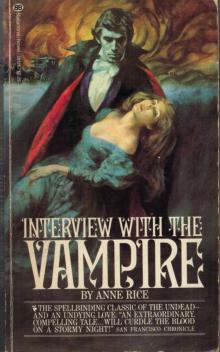 Interview with the Vampire
Interview with the Vampire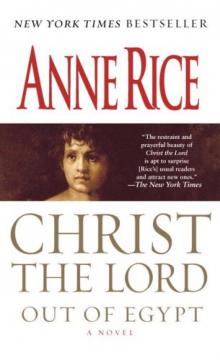 Christ the Lord: Out of Egypt
Christ the Lord: Out of Egypt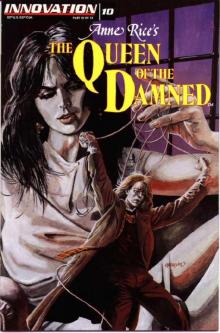 The Queen Of The Damned
The Queen Of The Damned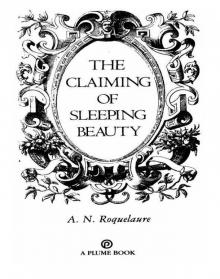 The Claiming of Sleeping Beauty
The Claiming of Sleeping Beauty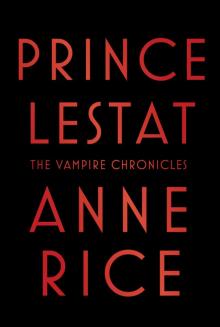 Prince Lestat
Prince Lestat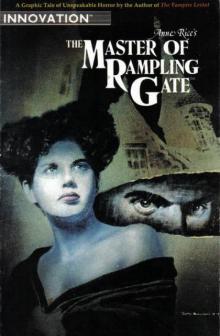 The Master of Rampling Gate
The Master of Rampling Gate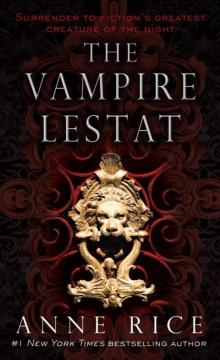 The Vampire Lestat
The Vampire Lestat Blood Canticle
Blood Canticle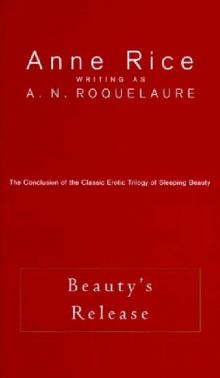 Beauty's Release
Beauty's Release Pandora
Pandora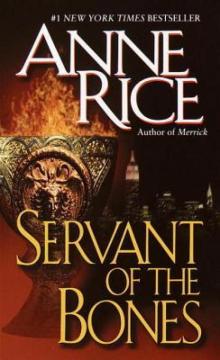 Servant of the Bones
Servant of the Bones Of Love and Evil
Of Love and Evil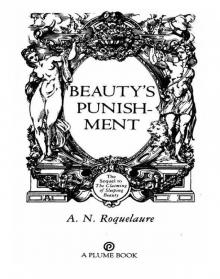 Beauty's Punishment
Beauty's Punishment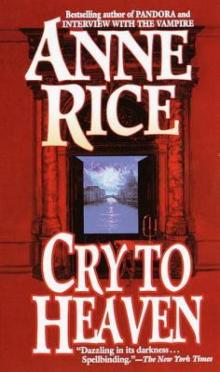 Cry to Heaven
Cry to Heaven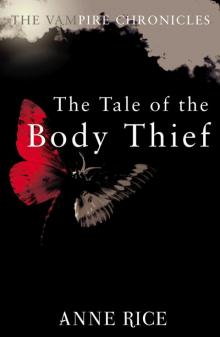 The Tale of the Body Thief
The Tale of the Body Thief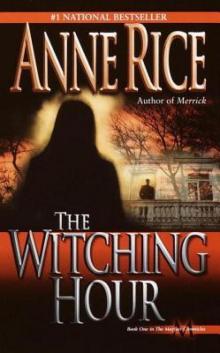 The Witching Hour
The Witching Hour Memnoch the Devil
Memnoch the Devil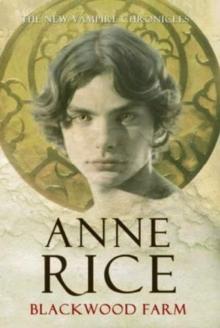 Blackwood Farm
Blackwood Farm Beauty's Kingdom
Beauty's Kingdom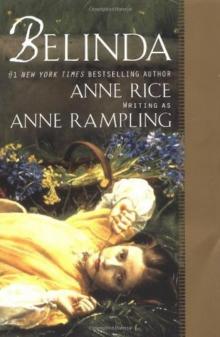 Belinda
Belinda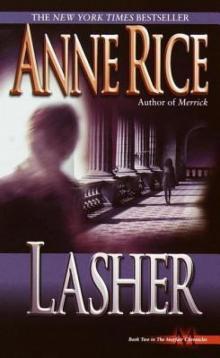 Lasher
Lasher Vittorio, the Vampire
Vittorio, the Vampire Angel Time
Angel Time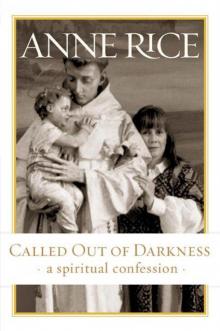 Called Out of Darkness: A Spiritual Confession
Called Out of Darkness: A Spiritual Confession Blood And Gold
Blood And Gold The Passion of Cleopatra
The Passion of Cleopatra Taltos
Taltos Exit to Eden
Exit to Eden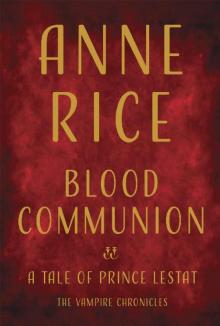 Blood Communion (The Vampire Chronicles #13)
Blood Communion (The Vampire Chronicles #13) The Wolf Gift
The Wolf Gift The Wolves of Midwinter
The Wolves of Midwinter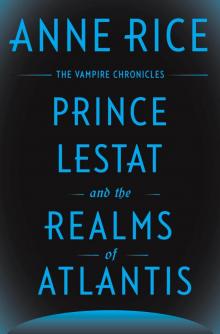 Prince Lestat and the Realms of Atlantis
Prince Lestat and the Realms of Atlantis The Ultimate Undead
The Ultimate Undead The Vampire Lestat tvc-2
The Vampire Lestat tvc-2 The Road to Cana
The Road to Cana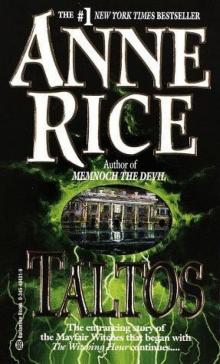 Taltos lotmw-3
Taltos lotmw-3 Merrick tvc-7
Merrick tvc-7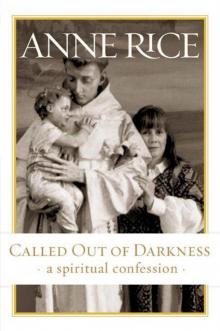 Called Out of Darkness
Called Out of Darkness Pandora - New Vampires 01
Pandora - New Vampires 01 Bllod and Gold
Bllod and Gold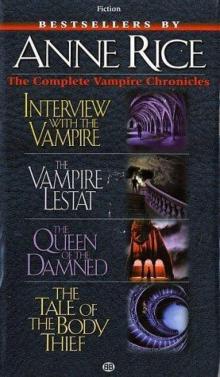 The Queen Of the Damned: Vampire Chronicles
The Queen Of the Damned: Vampire Chronicles The Sleeping Beauty Trilogy
The Sleeping Beauty Trilogy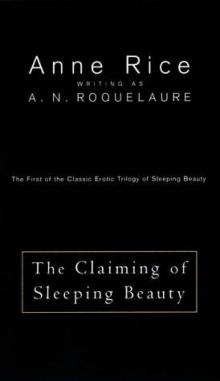 The Claiming of Sleeping Beauty b-1
The Claiming of Sleeping Beauty b-1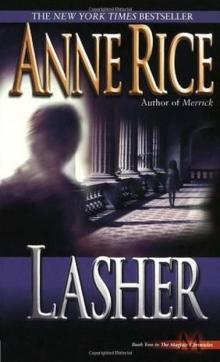 Lasher lotmw-2
Lasher lotmw-2 The Tale of the Body Thief tvc-4
The Tale of the Body Thief tvc-4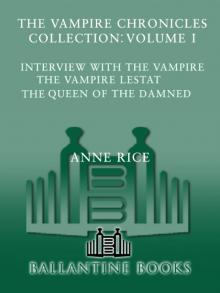 The Vampire Chronicles Collection
The Vampire Chronicles Collection Ramses the Damned
Ramses the Damned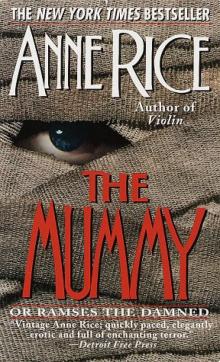 The Mummy - or Ramses the Damned
The Mummy - or Ramses the Damned Vittorio, The Vampire - New Vampires 02
Vittorio, The Vampire - New Vampires 02 The Vampire Armand tvc-6
The Vampire Armand tvc-6 Queen of the Damned tvc-3
Queen of the Damned tvc-3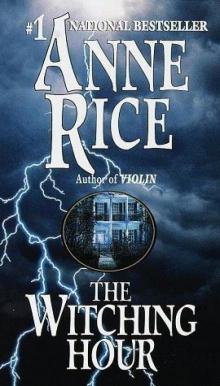 The witching hour lotmw-1
The witching hour lotmw-1 Feast of All Saints
Feast of All Saints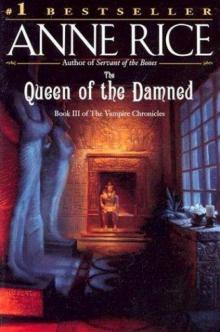 Queen of the Damned
Queen of the Damned The Wolves of Midwinter twgc-2
The Wolves of Midwinter twgc-2 The Mummy
The Mummy Blood and Gold tvc-8
Blood and Gold tvc-8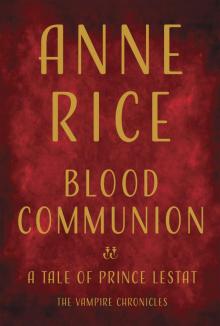 Blood Communion
Blood Communion Interview with the Vampire tvc-1
Interview with the Vampire tvc-1 Prince Lestat: The Vampire Chronicles
Prince Lestat: The Vampire Chronicles